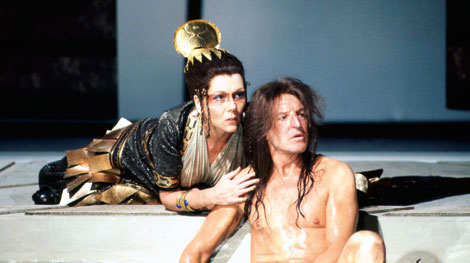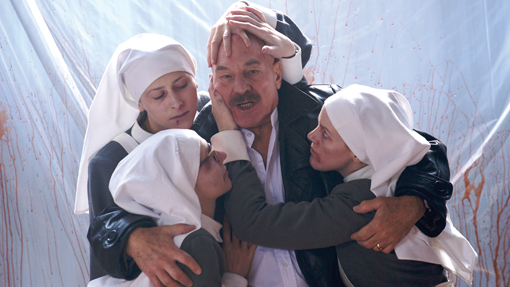A new three-year research project at the University Westminster is currently underway with the ambitious aim of collating information on all plays written for the theatre that have been produced for British television since 1930. The project’s Principal Investigator, John Wyver, and Research Associate, Dr Amanda Wrigley, provide an overview.
About the Authors:
 John Wyver is Principal Research Fellow at the University of Westminster, and a writer and producer with Illuminations, a company specialising in arts media production that he co-founded in 1982. His recent productions include the film of the Royal Shakespeare Company's Hamlet, 2009, with David Tennant for BBC/WNET/NHK; Rupert Goold's film version of his stage production of Macbeth, 2010, with Patrick Stewart for BBC/WNET; the three-part series Art of Faith, 2010, with John McCarthy for Sky Arts; and the forthcoming Art of Survival, a 6-part formatted documentary series for Sky Arts.
John Wyver is Principal Research Fellow at the University of Westminster, and a writer and producer with Illuminations, a company specialising in arts media production that he co-founded in 1982. His recent productions include the film of the Royal Shakespeare Company's Hamlet, 2009, with David Tennant for BBC/WNET/NHK; Rupert Goold's film version of his stage production of Macbeth, 2010, with Patrick Stewart for BBC/WNET; the three-part series Art of Faith, 2010, with John McCarthy for Sky Arts; and the forthcoming Art of Survival, a 6-part formatted documentary series for Sky Arts.
 Dr Amanda Wrigley is the project's Research Associate. Her research specialism is engagements with ancient Greece in Britain from the mid-19th century to the 1970s, particularly through such media as radio, television, theatre, paperback translations and non-élite educational schemes. More details of her research background and publications can be found here.
Dr Amanda Wrigley is the project's Research Associate. Her research specialism is engagements with ancient Greece in Britain from the mid-19th century to the 1970s, particularly through such media as radio, television, theatre, paperback translations and non-élite educational schemes. More details of her research background and publications can be found here.
On 15 July 1930 John Logie Baird’s experimental television system broadcast a version of Luigi Pirandello’s The Man with a Flower in his Mouth. Since Baird’s earlier offerings were mostly mixed variety bills there is a good case to be made that this is British television’s first distinct ‘programme’ – and it was an adaptation of a stage play. As soon as the BBC’s official service began in November 1936, extracts from theatre plays were an essential strand of the schedule. Later, throughout the 1940s and 1950s, theatre plays on television were central both to the BBC’s output and then to the early years of ITV. Today, however, terrestrial television rarely draws on anything written for the theatre and live broadcasts from the Royal National Theatre and elsewhere have found a home on arthouse cinema screens both here and abroad.
Stage plays on television have also received comparatively little attention from critics and media historians. Television studies over the past two decades has concentrated on original drama written for the medium, whether it be the plays of Dennis Potter or the exploits of Doctor Who. Concerned to establish and explore the specificity of the television medium, academic engagement with television drama has to date marginalised theatre plays on television and to a significant degree dismissed them as being … theatrical.

Diana Rigg in 'The Serpent Son: Part One: Agamemnon' screening at the BFI Southbank in June.
Screen Plays: Theatre Plays on British Television (http://screenplaystv.wordpress.com/) is a three-year research project, based in the School of Media, Arts and Design at the University of Westminster and funded by the Arts and Humanities Research Council, that aims to document all productions on British television since 1930 of plays that were first written for the theatre. We are producing a database of information about all of these productions, which we believe to total just over 3,000 (of which around 1,000 have been preserved in the archives). We are working on conferences – the first of which will be in October this year – journal articles and two books as well as activities with partners including a BFI Southbank season of Greek plays on television in June (see here).
We hope that Screen Plays will help to reveal the rich results of the many disparate interactions between the theatre and television across the past eighty-plus years. These include the obvious high points like the Play of the Month series that ran from 1965 to 1983 on BBC1 and prestigious productions for ITV with Laurence Olivier such as Long Day's Journey into Night (ATV, 1973), originally seen at the National Theatre. But we are also fascinated by the earliest theatre plays featured on television in the 1930s, including a modern dress version of Julius Caesar mounted by producer Dallas Bower in 1938, and a version of The Tempest made some months later with Peggy Ashcroft as Miranda. We want to look at dramas made for BBC Schools (where the only television version of Sophocles’ Philoctetes was presented in 1961-62) and for the Open University, which produced a major series of sixteen stage plays in 1977, including an impressive Macbeth with Corin Redgrave.
We want to look at dramas made for BBC Schools ... and for the Open University
Our canon includes both productions of stage plays newly produced for television and also translations from the theatre to the small screen of productions first mounted in the theatre. Rupert Goold’s film Macbeth (BBC, 2010) is a recent (and, in the twenty-first century, all-too-rare) example of the latter form, which can be regarded as having its origins with the re-presentation at Alexandra Palace in BBC Television’s opening week of scenes from the Scottish comedy Marigold. Broadcast live on 6 November 1936, and then twice more two weeks later, the half-hour of extracts were drawn from a production then running at the Royalty Theatre in London’s West End. The company was paid £50 for the first showing and £75 for the two repeats.
We are also exploring the history of outside broadcasts from theatres, which are continued today by NT Live but which began with the first transmission of a complete play from the theatre in November 1938. J. B. Priestley’s When We Are Married was enjoying a successful run at the St. Martin’s Theatre when producer Basil Dean allowed the BBC to bring three cameras into the auditorium and to devote a complete evening’s programming to the show. The anonymous reviewer for The Times believed that,
It would not seem … that at present the theatre has much to fear from television. Those who found it a strain upon the eyes to follow the farce act by act and went in to the auditorium were in a position to judge the difference between what Mr. Basil Dean, in a curtain speech, called ‘the magic of human personality’ and its black and white shadow. The actual stage seemed to be bursting with life and colour.
We are compiling the details of these productions through a scrutiny of the day-by-day records of Radio Times and TV Times, and then complementing these with material from the production files held in the BBC Written Archives Centre at Caversham, by contemporary reviews and by a host of other written sources as well as interviews with those who worked on the productions. Wherever possible we are also, of course, watching recordings of television stage plays, although none exist from before It is Midnight, Doctor Schweitzer, which was shown in February 1953.

Rupert Goold's Macbeth (2010), with Patrick Stewart as Macbeth and the witches (Image courtesy of Illuminations/BBC).
A good number of stage plays for television exist from the 1950s and 1960s, but a good many more were either never recorded or were ‘junked’ when the expensive master tapes were needed for something new. Fortunately a terrific cache of recordings that were otherwise thought to have been lost were recently found at the Library of Congress archive in Washington D.C. and the BFI National Archive now has precious copies of these.
Central to our work is the blog that we are contributing to several times each week: http://screenplaystv.wordpress.com. We are using this to present elements of our research and to discuss our methodology, including the question of whether particular kinds of productions (like musicals, for example) should be regarded by us as ‘stage plays’. We also welcome discussions of our research on the blog and we have been delighted that several people who worked on particular productions have used the blog to make contact with us.
Among the most popular posts on the blog are a discussion of the Open University Macbeth and a series of detailed discussions of Greek plays on television that Amanda has been writing, and which constitute part of her work towards a forthcoming book. These case studies feature, for example, a remarkable production of Electra by Sophocles, which was recorded in modern Greek (!) by Associated-Rediffusion for ITV in 1962. A version of a touring production by the Greek Peiraïkon Theatron company, this one-hour drama was shown without subtitles at 9.45 on a Wednesday evening. Somehow it seems unlikely that today’s ITV might repeat the experiment.
Electra will be one of the productions to be shown at BFI Southbank in June; further details of this and the rest of the season can be read here and details of the associated symposium found here. The Screen Plays conference ‘Theatre Plays on British Television’ will be held at the University of Westminster on 19 October 2012, and the programme is now online here. We look forward to a truly interdisciplinary discussion involving scholars and postgraduate students working on the histories of broadcasting, media, drama, theatre and culture; anyone interested in the rich and varied life of stage plays on British television is encouraged to register to participate in what we hope will be a fascinating day’s discussion. The conference will be held at a central London venue on 19 October 2012. If you would like to be informed when booking opens, please email Amanda Wrigley.
Dr Amanda Wrigley John Wyver